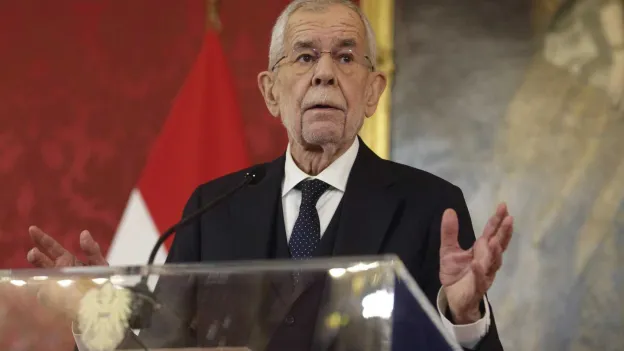
Pro-Russian Nationalists Given Green Light to Form Cabinet in Austria

vienna - Pro-Russian nationalists in Austria have been given the green light by the head of state to form a new government after the sudden resignation of the conservative government leader caused a political crisis in the Alpine country.
With his gray hair, the political senior Alexander Van der Bellen (80), slid across the carpet in the satin-red hall of his palace. By midday, he declared the watershed to hand over the country's governance to the radical FPÖ: "Our country needs a workable government. With a robust mandate of more than fifty percent of the votes in the National Council."
In the parliament in Vienna, the Nationalrat, which is also part of the imperial Hofburg complex in the Danube city, the last elections were won by the oppositional FPÖ, a party that has a friendship agreement with Moscow, tolerates corrupt ministers, and is eurosceptic.
Their leader, Herbert Kickl, will now lead the coalition talks as the leader of the strongest party. He had already stated in the campaign that he wanted to become 'Volkskanselier', a term from the Nazi era. Kickl (56) sees himself as a 'people's tribune with a mission'.
Other countries see him as a security risk. Several EU countries, including the Netherlands, halted the exchange of intelligence services when Kickl, former Minister of Interior, conducted a house search with some officers at the country's Secret Service BVT to seize incriminating files of far-right extremists. Kickl admires the authoritarian Hungarian Prime Minister Viktor Orbán, who cracked down on the free press and judiciary.
President Van der Bellen reluctantly gave him the mandate for coalition talks. After the elections, he first tasked incumbent Chancellor Nehammer and his conservative ÖVP, which came second in the elections, with forming a coalition. 'The ÖVP with Nehammer then ruled out working with FPÖ under Kickl,' the president stated. However, Nehammer surprisingly resigned Sunday evening when talks with the Social Democrats (SPÖ) and Liberals (Neos) failed.
Former Vice-Chancellor Heinz-Christian Strache had been embroiled in the Ibiza scandal. In 2017, after secret recordings were made public, the Austrian government collapsed. Strache disappeared through the back door. Young Chancellor Sebastian Kurz (ÖVP) went on to govern with the Greens until his resignation due to corruption suspicions and manipulation of opinion polls.
The head of state is concerned about Austria's ongoing problems, including being in a recession and the need for government budget cuts. President Van der Bellen also mentioned the 'geopolitical threat', referring to the Russian war against Ukraine.
The future remains uncertain, but political scientist Peter Filzmaier from the University of Graz believes that the likelihood of a coalition between the right-wing parties FPÖ and ÖVP is high and that new elections may not be necessary.


Leave a comment